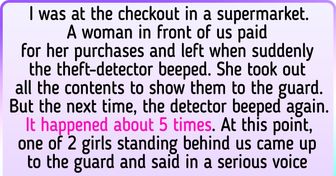“Filler/Botox face!” Mike Myers Shocks Fans With His Transformed Look

Have you ever noticed how insects seem to get bigger in certain parts of the world?
Take Australia and the Amazon rainforest, for example. They’re notorious for having some of the largest and creepiest crawlies around. What’s the deal with these hotspots of insect activity? Warmth plays a part in insect growth, but it’s not the only factor at play. You won’t get bugs that large out in the desert, for instance, despite the heat.
The real secret lies in their access to water. In tropical and subtropical environments, there’s usually plenty of moisture to go around, which means a year-round supply of delicious snacks.
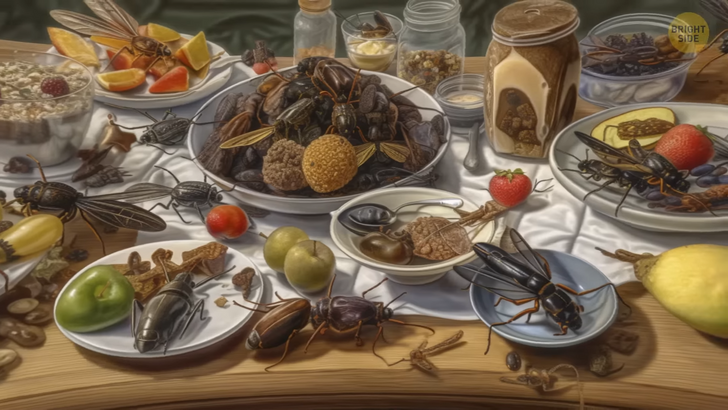
Speaking of snacks, that’s where things get interesting. The warm, wet environment creates the perfect conditions for an all-you-can-eat insect buffet, which allows insects to grow and thrive over time. This is true for rats, too — just look at the giant rodents that live in cities, where they can feast on all kinds of garbage and scraps. For bugs, the perfect gem is usually found near the equator, in places like Central and Southern America, parts of Africa and Asia, and Northern Australia.
Have a look at this one. It’s special not because of its large size. Humans rarely see this insect. It’s a wood moth and was spotted at a school in Australia. The school is close to a rainforest. It holds a record for being the heaviest moth in the world. It had a wingspan measuring up to 9 inches. In Australia, there are about 60 species of wood moth. Yet many aren’t as big as the giant wood moth. The students get to face many animals on campus, such as bush turkeys, koalas, and snakes, but according to the principal, seeing a wood moth was a brand-new thing.
When we start talking about insects in Australia, it’s also hard not to mention spiders. They are impressively big! Again it’s all thanks to the warm climate and abundance of food sources in the Australian bushlands! Like most cold-blooded animals, spiders tend to grow bigger in warmer places. The Australian climate, especially in the northern and central parts, is hot and humid, making it the perfect environment for spiders to grow and thrive.
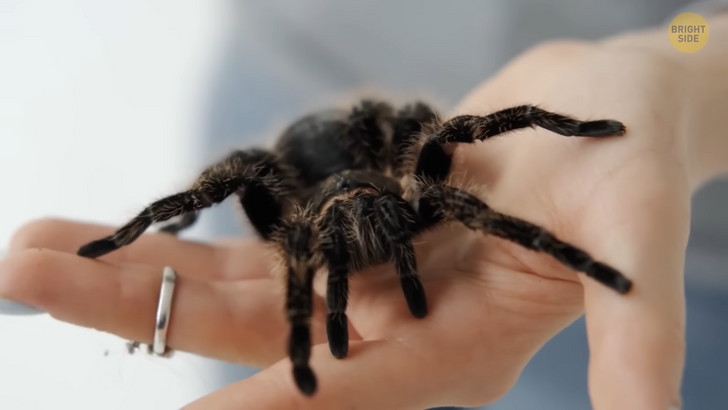
Spiders are also sensitive to temperature, so warmer climates provide them with longer periods to grow before reproduction. Australia’s vast bushlands provide more insects for spiders to prey on, making them bigger and stronger. From the Crab Spider to the Australian Bird-Eating Spider and the Huntsman. Although they may look scary, most of them are not dangerous to humans. Now we can take a deep relaxing breath.
So, how do Australians handle big spiders without going crazy? I mean, we are talking about a country that is home to about 10,000 species of spiders. Australians treat spiders with respect despite the cases of spider bites. They acknowledged that these creatures are not here to scare people; they’re an irreplaceable component of the ecosystem. When they face a spider at home, they call the experts if there’s no one brave enough to capture the spider and take it outside.
Here are some weird-looking animals from Australia. I must admit some look creepy, and some look cool. This one here is a hot pink slug. It has a striking bright pink coloration, which is believed to be an adaptation to their environment. This creature is among the rare and endangered species. You can find it only in a single place; Mount Kaputar National Park. It’s near an isolated forest on an old volcano.
İnsects are part of everyday life in certain parts of this country. A person was mowing the lawn, and a surprise was waiting for them. They discovered this 14-inch tall insect.
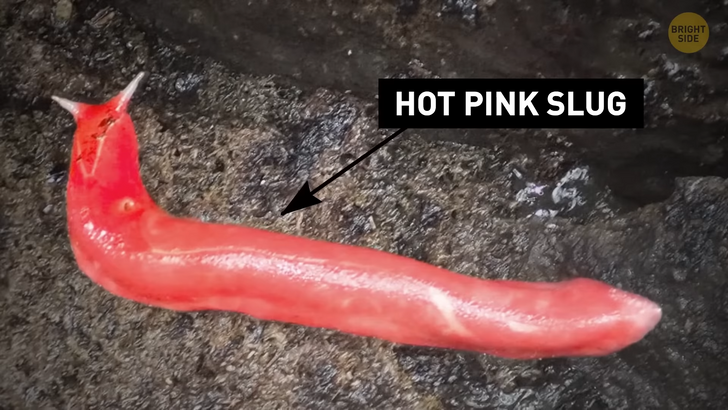
And this person was kind enough to fill the bird bath on a hot day. Then they noticed that birds didn’t go near the bath. They wondered why and checked it out. Well, hello there!
Next up, we have this giant insect, and it’s still alive. Why is it such a shocking thing? Because umm... It was declared extinct nearly a century ago! I guess it’s back from the other side? It’s the Lord Howe Island stick insects, aka the tree lobsters! These giant bugs, measuring about 6 inches, used to call this place their home sweet home, but black rats had other plans. These rodents invaded the island, gobbling up everything in their path, including the poor stick insects.
By 1920, the bugs were officially declared extinct, but as fate would have it, they made a comeback more than 40 years later on Ball’s Pyramid, a volcanic sea stack located 12 miles away. But here’s the twist — the new and improved stick insects looked slightly different from their ancestors, leaving scientists scratching their heads, wondering if they were the real deal. After some scientific sleuthing and DNA testing, the verdict is in — they’re the same species! With less than 1% genetic difference, these plant-eating critters are ready to make a triumphant return to their homeland.
We’re about to take the creepy crawlies to a whole new level. In Australia, there’s a centipede that’ll make you want to crawl out of your skin. I must also say these animals are nocturnal too. Can you imagine waking up with one of these 6-inch-long centipedes crawling across your foot?
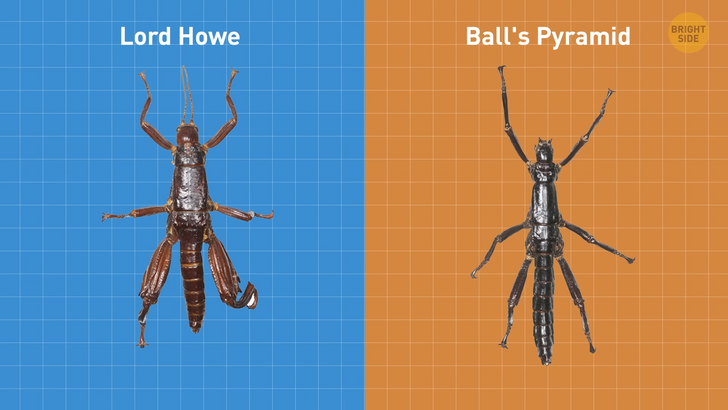
Have you ever seen an insect that looks like it came straight out of a science fiction movie? Well, let me introduce you to the Australian walking stick. If we showed you a picture of this creepy crawler, you’d probably think we had some mad Photoshop skills. But no, this stick insect is as real as they come! It’s hard to believe such a bizarre-looking creature could actually exist in nature. This just goes to show how incredible and mind-boggling nature can be.
Picture this: you’re wandering through your garden, minding your own business, when suddenly you walk face-first into a sticky web. Before you have a chance to freak out, you see the culprit — a garden orb weaver spider. These nocturnal creatures might look scary with their large, hairy bodies and red-brown to yellow markings, but luckily they’re harmless to humans.
In fact, having them around can be a good thing since they help to reduce insect pests like mosquitoes. Their webs are truly a marvel of nature — strong and nearly invisible, with a large capture area for prey. And if you accidentally break their web, don’t worry — they’ll usually get the hint and move somewhere else. So go ahead and enjoy your garden, but watch out for those sneaky garden orb weavers!
Check out this hefty Aussie critter, the Burrowing Cockroach. Unlike those pesky flying roaches, these fellas are wingless and not considered a nuisance. They’ve got a vital role to play in the ecosystem, munching on fallen leaves and recycling other organic matter. You might find them chilling out in a cozy burrow. In fact, they’re the only known cockroach with a permanent subterranean abode. These crawlies are practically celebrities in Brisbane, where they’re even kept as pets.
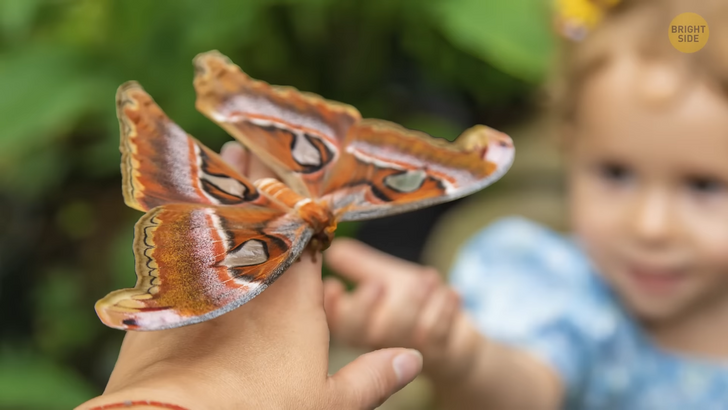
Our next subject is the Hercules moth! This “little” thing can only be found chillin’ in New Guinea and northern Australia. Now, let’s talk about why the Hercules moth is so impressive. For starters, it’s massive! It boasts a wingspan of 11 inches, making it the biggest moth in all of Australia. Not only that, but its wings have a surface area, making it the largest of any insect alive. Talk about impressive!
When it comes to appearances, the Hercules moth is mostly golden-brown and white, with see-through spots on each of its four wing sections. The coloring and patterns don’t differ too much between males and females, but the males have longer, skinnier tails on their wings. The thing about these types of animals is that you never know where they’ll fly. Will they land on your shoulder or the tree next to you? Have you ever encountered a giant insect? If yes, what did you do? Tell us your story.


